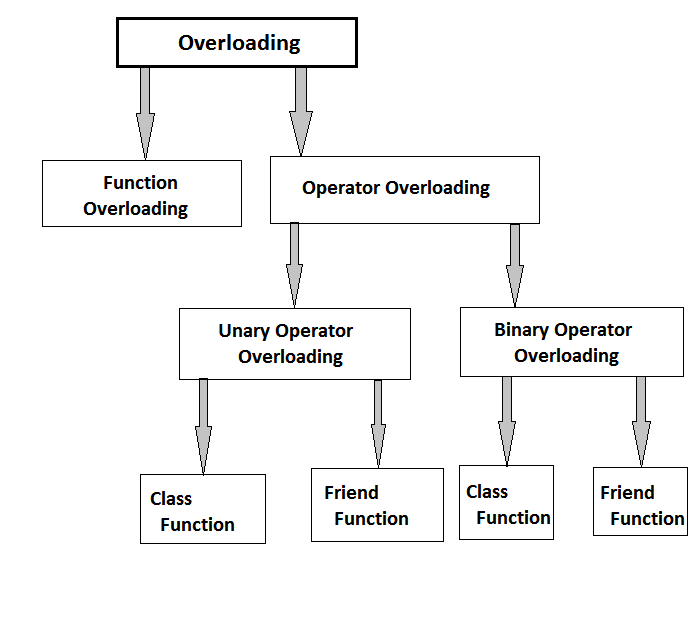In this article Operator Overloading in C++ we give the information about A Operator which contain only one operand is called unary operator overloading.
Operator Overloading in C++:
Define Overloading Overloading:
“To assign more than one operation on an same operator known as operator overloading.”
Overloading we have to write a special function know as operator().
Operator Overloading Syntax:
return_type operator operator_symbol(argument_list)
{
statement(s);
}
you can write operator() in two ways-
- class function
- friend function
In C++, most of the operator’s can be overloaded, but there are some operator’s in it which cannot be overloaded. Operator’s which cannot be overloaded are the following:-
scope operator – ::
sizeof
member selector -.
member pointer selector – *
ternary operator -?:
Rules of Operator Overloading:–
There are some important rules for this which we have to keep in mind.
- Only built-in operators can be overloaded. If some operator is not present in C++ then we cannot overload them.
- The precedence and associatively of operators cannot be changed.
- We cannot use the friend function to overload any particular operators. But, we can use the member function to overload these operators.
- It is necessary to define assignment “=”, subscript “[]”, function call “()” and arrow operator “->” as member function.
- The overloaded operator must include at least one operand of the user-defined data type.
- An overloaded operator cannot hold default parameters.
- Some operators such as – assignment “=”, address “&”, and comma “,” are already overloaded.
Type of Overloading:
There are two types of Overloading such as follows
- Function overloading
- Operator Overloading
Operator Overloading:
There are two types of operator overloading in C++ such as
- Unary Operator Overloading
- Binary Operator Overloading

1. Unary Operator Overloading:
A Operator which contain only one operand is called unary operator overloading.
Syntax:
1. Class Function
return_type operator operator_symbol()
{
statement(s);
}
2. Friend Function:
friend return_type operator operator_symbol()
{
statement(s);
}
Unary Operator overloading Program:
// Unary Operator Overloading – Using Class function
#include<iostream.h>
#include<conio.h>
class demo
{
int a,b;
public:
demo(int x, int y)
{
a=x;
b=y;
}
void show()
{
cout<<“\n A: “<<a<<“\t B: “<<b;
}
void operator -()
{
a=-a;
b=-b;
}
};
void main()
{
clrscr();
int p,q;
cout<<“\n Enter the two numbers: “;
cin>>p>>q;
demo obj (p,q);
obj.show();
-obj;
obj.show();
getch();
}
O/P:-
Enter the two numbers: 10
20
A: -10 B: -20
// Unary Operator Overloading – Friend function
#include<iostream.h>
#include<conio.h>
class demo
{
int a,b;
public:
demo(int x, int y)
{
a=x;
b=y;
}
void show()
{
cout<<“\n A: “<<a<<“\t B: “<<b;
}
friend void operator -(demo &obj);
};
void operator -(demo &obj)
{
obj.a=-obj.a;
obj.b=-obj.b;
}
void main()
{
clrscr();
int p,q;
cout<<“\n Enter the two numbers: “;
cin>>p>>q;
demo obj (p,q);
obj.show();
-obj;
obj.show();
getch();
}
O/P:-
Enter the two numbers: -10
-20
A: 10 B: 20
2. Binary Operator Overloading:-
A operator which contain two operands is called Binary Operator Overloading.
Syntax:
1. Class Function
return_type operator operator_symbol(Argument List)
{
statement(s);
}
// Binary Operator Overloading – Using Class function
#include<iostream.h>
#include<conio.h>
class demo
{
int a,b;
public:
demo()
{
}
demo(int x, int y)
{
a=x;
b=y;
}
void show()
{
cout<<“\n A: “<<a<<“\t B: “<<b;
}
demo operator +(demo obj)
{
demo temp;
temp.a=a+obj.a;
temp.b=b+obj.b;
return temp;
}
};
void main()
{
clrscr();
demo ob1(5,6), ob2(10,20), ob;
ob=ob1+ob2;
ob.show();
getch();
}
O/P:
A: 15 B: 26
2. Friend Function:
friend return_type operator operator_symbol(Argument List)
{
statement(s);
}
// Binary Operator Overloading
#include<iostream.h>
#include<conio.h>
class demo
{
int a,b;
public:
demo()
{
}
demo(int x, int y)
{
a=x;
b=y;
}
void show()
{
cout<<“\n A: “<<a<<“\t B: “<<b;
}
friend demo operator +(demo &obj, demo &obj2);
};
demo operator +(demo &obj, demo &obj2)
{
demo temp;
temp.a= obj.a+obj2.a;
temp.b= obj.b+obj2.b;
return temp;
}
void main()
{
clrscr();
demo obj(5,6); demo ob1(10,20); demo ob2;
ob2=obj+ob1;
ob2.show();
getch();
}
O/P:
A: 15 B: 26
Some More:
POP- Introduction to Programming Using ‘C’
OOP – Object Oriented Programming
DBMS – Database Management System
RDBMS – Relational Database Management System
Join Now: Data Warehousing and Data Mining